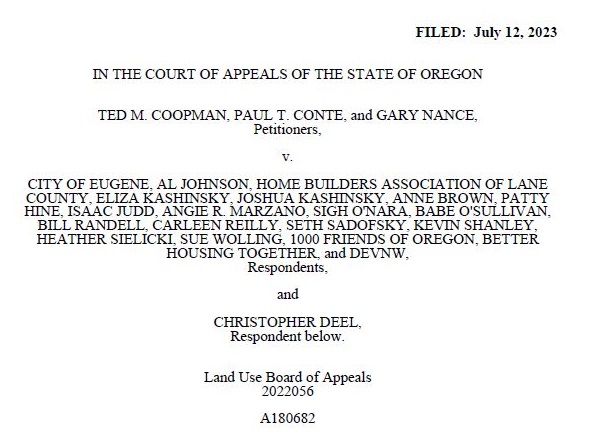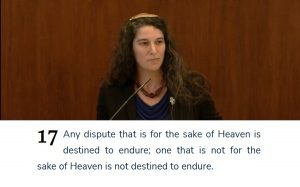Court sides with Eugene HB2001 opponents; public services plan must consider higher density
6 min read
by John Quetzalcoatl Murray
A court agreed with Eugene HB2001 opponents who say the city’s land use changes did not comply with statewide planning Goal 11.
The July 12 Court of Appeals decision reopens a contentious debate on middle housing and raises new questions about how the city conducts public engagement.
HB2001 required large cities to allow middle housing—duplexes, triplexes, quadplexes, townhouses, and cottage clusters— wherever it allows residential detached single-family dwellings.
Planning goal 11 requires cities to plan to supply public services and facilities at an appropriate level for the planned density in that area: Higher density areas should have more services. The state website for Goal 11 offers several examples of public services, including water and sewer services, police and fire protection, and other local government services, such as building permitting.
The Court of Appeals decision concluded that the city should have considered the impact on public facilities and provisions before adopting its HB2001 land use code amendments.
“We agree…that the city did not adequately address Goal 11 in its findings,” the decision stated.
While the legislature allowed cities to seek an extension of time “to adopt regulations or amend its comprehensive plan for an area where it has identified certain infrastructure and transportation services ‘that are either significantly deficient or are expected to be significantly deficient before December 31, 2023,'” the City of Eugene did not seek an extension.
And while the city could have complied with Goal 11 in several ways—updating its public facilities and services plan; enacting model code that restricts development when there is insufficient infrastructure; or undertaking a study to predict the increased impacts on the Goal 11 facilities—it did not.
The city erred (and the Land Use Board of Appeals erred when it affirmed the city’s conclusion) in not considering the impact of the amendments to the Eugene Code and Metro Plan on its provision of public facilities and services “at the time it adopted them,” according to the ruling.
“We reverse LUBA’s conclusion that the city did not have to consider updates to its public facilities and services plan when amending its code and Metro Plan to allow for middle housing,” the court wrote. “We therefore remand to LUBA for further proceedings.”
Ted Coopman, Paul Conte, and Gary Nance argued that it is necessary to review infrastructure plans originally designed for single-family homes, now that the HB2001 mandate allows an entire neighborhood of quadplexes.
The ruling drew immediate reaction, with Paul suggesting that specific development projects can now be challenged.
Paul said HB2001 radically rezoned Oregon cities “in one fell swoop,” increasing density by up to five times in vast low-density areas. He expected service issues to appear in the wildland urban interface along the urban growth boundary, where the city must now ensure sufficient capacity for fire response.
“To proceed further with a middle housing project or application under the current circumstances would be at risk of being revoked and possibly having to remove any construction that was already done,” Paul wrote.
Housing advocate Eliza Kashinsky, who supported incentives designed to produce more housing, foresaw a quick fix as the issue headed back to the Land Use Board of Appeals.
“I am, of course, disappointed in the Court of Appeals decision,” Eliza said. “I am even more disappointed in Ted Coopman and Paul Conte, who appear to be grasping at any straw they can find to create confusion and delay, and thus prevent the creation of homes that Eugene so desperately needs.”
She quoted from the court decision, which suggested that Eugene can simply “adopt provisions similar to those in the model code that limit middle housing on lots that lack sufficient infrastructure to support it.”
Eugene wouldn’t even need to adopt new provisions, she said. Provisions similar to those in the model code preventing development “on lots that lack sufficient infrastructure” already exist within Eugene’s code for all development, not just middle housing.
Ted Coopman responded to criticism of the court challenges by saying, “The success of appeals is proof of their legitimacy.”
Ted said Eugene is the only city to get its HB2001 compliance plan remanded and that officials and staff should have listened to the public.
“The time and taxpayer expense for this appeal was completely avoidable and is indicative of a deeply dysfunctional public comment process and inadequate oversight of an out-of-control Planning Department,” he said.
Let public comment serve its proper role, he said. “The purpose of public comment is to surface issues and deficiencies and add needed context and perspectives to staff proposals so we create the best possible ordinances and avoid the expense and delays of court challenges.”
Obviously, a city must have adequate infrastructure before approving high-density construction. But instead of incorporating public comments, Ted said, “overly zealous Planning Commissioners like Dan Isaacson…vociferously opposed” any challenges or critiques of staff plans as “disrespectful.”
“This debacle was completely avoidable,” Ted said. “Now we are, once again, back to square one. Eugene taxpayers and voters deserve better.”
“The City Council needs to greatly increase oversight of public processes and create accountability for these types of serious and expensive errors. There are currently no consequences for such egregious and costly mistakes,” Ted said.
Dan Isaacson denied acting disrespectfully, “other than the joint meeting with the city council where we all felt it important to call attention to how volunteers were treated and ‘how’ we collectively disagree about policy.”
Here are the statements Dan presented to the city council April 18, 2022, as vice chair of the Eugene Planning Commission:
“As we take up the torch of equity and sustainability, we cannot overlook our obligations to make changes. And as always, change invites both pushback and fear from those who have enjoyed the benefits of a system that now seeks to include others,” he said. “With every new proposal our city has put forward to grow and to be more inclusive, there have been voices of opposition and fear… With every expansion of the opportunities afforded to some granted to the new, we hear the same arguments, the same fear, the same people benefiting from both. Please take time to ask yourself why that is…”.
He said in his role as vice chair of the Eugene Planning Commission he reached out to over 100 people, most of them opposed to the city’s approach. “I began each call with the statement that I hadn’t yet made my mind up and wanted to (with their agreement) to discuss their concerns as well as flush out any misconceptions they may have heard. Almost every conversation I had was cordial and informative.”
The public engagement conducted throughout the city was widely criticized at the time. An internal whistleblower at the city said neighborhoods were deliberately excluded from effective participation, while Councilor Matt Keating prevented a neighborhood organization from recording HB2001 changes requested by residents, saying that he did not agree with their ideas.
Pam Wooddell suggested examining other options for the Committee for Citizen Involvement, which is required under Planning Goal 1.
While the land use laws require that every city have a citizens’ involvement committee, “Eugene picked the least democratic, the least good way, which was to bury it in the Planning Commission,” she said.
It was up to the Planning Commission to assure that the public has had proper engagement, she pointed out. “The testimony that Dan Isaacson gave as a Planning Commissioner, I felt it was out of place,” said Pam Wooddell. “Sadly, Eugene has picked the least best way to assure public participation.”
The city did not respond to questions about the Court of Appeals ruling. A special edition of the EUG Planning Newsletter released on July 18 stated, “The Middle Housing Code Amendments will remain in effect during this appeal process.”
To learn more about the middle housing code amendments, see the City of Eugene Planning website.
Updated July 19, 2023, 6:30 p.m., in response to a request from Eliza Kashinsky.







